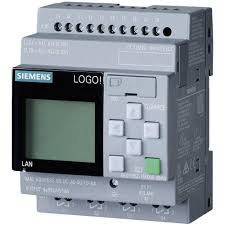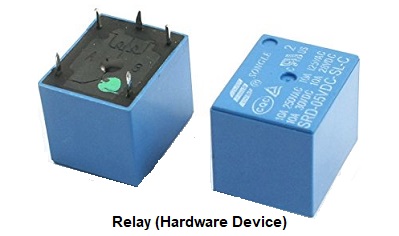
Difference between Programmable Logic Controller (PLC) and Relay?
In this tutorial, I am explaining each and every point considering the difference between them, the advantages of PLC over relay, and vice-versa.
Table of Contents
Basic Introduction to Relay and PLC
Dive into some of the basic questions and doubts most of us we have…
What is Relay?
A relay is an electro-mechanical operator switch. In the earlier days, different types of relays are used for the electric protection/controlling system.
It is a hardware switching device to control the electrical circuit by using switching logic.
What is PLC?
Now a day, Programmable Logic Control (PLC) is a mini computerized industrial controller that controls the circuit.
Read in detail: What is Programmable Logic Control (PLC)?
In PLC, The basic concept of an electronic controlling system is to convert simulate the functional logic into different PLC brands’ software for automation. So, it provides a software-based solution.
Is Relay the same as PLC?
For the controlling electro-mechanical system, the basic functions of both Relays and PLCs are the same in the industries.
Then why PLC?
What is the Advantage of PLC over Relay?
If we compare the relay with PLC, PLC systems perform better in terms of work, accuracy. PLC requires less time, less wiring.
PLC is easy to maintain. There will not be much physical work. PLC has more advanced functions as compared to manual work (hardware relay-base).
These are the main reasons, why the industries are shifting to use PLCs over the relay.
What is the Disadvantage of Relay?
The main disadvantage is, the relay needs more wiring for performing different functions.
Now, let’s start understanding the working, different functions, and operations of both PLC and Relay in detail…
Top 13 Difference Between PLC and Relay Based Controller
Comparing PLC vs Relay tablewise!
| # | Contents | PLC | Relay |
| 01 | Basic | Programmable Logic Control (PLC) is a solid-state computerized industrial controller that performs software logic by using input & output modules, CPU, memory, and others. | Relay is an electro-mechanical switching hardware device (Hardware Switching Device). |
| 02 | Function | PLC plays a monitoring as well as controlling role in designing circuits. | Relay plays only a controlling role in the designing circuit. Monitoring is not so easy with a relay. |
| 03 | Working | In the PLC, we can write the program using different types of programming languages. | In the Relay, we cannot write the program. |
| 04 | Operation (Digital & Analog Signals) | PLC is operated on the digital system. | Relay is operated on the analog system. |
| 05 | Function | PLC consists of more programming functions like timer, counter, memory, etc. | Relay gives only one fault detection function. And it does not have much-advanced functionalities. |
| 06 | Design | You can easily modify the designing circuit. | Modification of the electronic circuit is more difficult as compared to PLC. |
| 07 | I/O | PLC has more capabilities of input and output modules. | The relay does not have more capabilities. |
| 08 | Flexibility | PLC provides more flexibility than the relay. | The relay provides less flexibility. |
| 09 | Fault | You can easily find the fault by using the software. | It is very hard to find fault in the Relay circuit. |
| 10 | Time | PLC has a time response of nearly 50 msec and above. | Relays have less than 10 msec response time. |
| 11 | Memory | It consists of memory to store the program. | It does not consist of memory. |
| 12 | Types of PLC & Relay |
There are two types of PLC as-
|
Following the list of types of the relay-
|
13. Picture of PLC Hardware and Relay (How does it look?)
In the following picture, you are looking at a compact PLC and Relay hardware device.

Compact PLC Model

Both the PLC and Relay hardware, you will get. Check here, PLC hardware module, and the hardware relay.
From this tutorial, I have covered the 13 different points between them. You find few similarities as both are used as controllers.
But, they are different from the working, operations point of view. This also shows the advantages of PLC over programmable Relay.
PLC Related Read:
- Compact PLC Vs Modular PLC
- Rung & Rail of PLC
- Rack & Chassis of PLC
- Advantages & Disadvantages of PLC
- Applications of PLC
Ready for Test:
If you are ready for online test, here is a PLC Automation Quiz.
If you have any point or queries over the difference between plc and relay, please comment.
Happy PLC Programming!

It sure is good to now that PLC programming is a software-based solution that helps us to simulate functional logic for software automation. I think businesses would be able to benefit in these types of automation systems in order to make increase their productivity and cut down on handling time because of the speed that comes with the software. Thanks for educating me about the benefits of PLC programming.
Most welcome, Florence Welch! Yup, PLC is important in the automation system. Especially, it is benefits to consuming additional manpower, time, utility, easy programming and accurate operation in the system. And the most benefit is, it gives a precise operation with less time consumption.
Very nice write up. Thank you for publishing this.
You are most welcome, Steve!
Thank you
It’s really needful information.
Kindly send me a software of plc.
Hi Santosh,
In the earlier tutorial, I shared the free version of the Delta PLC Software’s link. You can easily download and install it.
Tutorial link:
[Step-by-Step] How to Learn PLC Programming at Home for Free?
Can you please write a blog on difference between PLC vs SCADA vs HMI vs electric relays.
I really appreciate this blog info.
Thanks, Erric Ravi for reaching out to the blog.
I have noted this point. Sure, I will share it early.
Dear Madam, I have one query. I have read the above article.
The program can’t write in the relay but, we are using ABB 615 relay in that we are loading the program in the relays for logic without PLC. These relay is also having memory and close-open logic operation.
Have you worked on those relays?
Thanks for the update, Hemant. I will correct this point.
Actually, I have worked on the electromechanical relay. And I didn’t get a chance to work on ‘ABB 615 relay’.
For my examination, it is a perfect note. Thank you.
Thanks, you too reach out to my blog.
Very impressive work keep it up my dear.
Thank you.